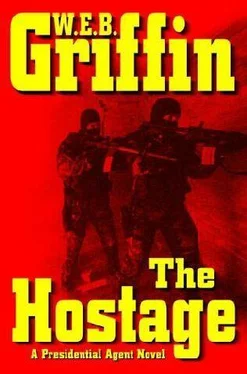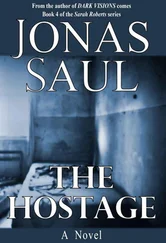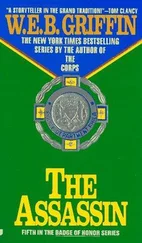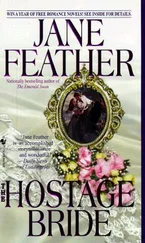W. Griffin - The Hostage
Здесь есть возможность читать онлайн «W. Griffin - The Hostage» весь текст электронной книги совершенно бесплатно (целиком полную версию без сокращений). В некоторых случаях можно слушать аудио, скачать через торрент в формате fb2 и присутствует краткое содержание. Жанр: Триллер, на английском языке. Описание произведения, (предисловие) а так же отзывы посетителей доступны на портале библиотеки ЛибКат.
- Название:The Hostage
- Автор:
- Жанр:
- Год:неизвестен
- ISBN:нет данных
- Рейтинг книги:4 / 5. Голосов: 1
-
Избранное:Добавить в избранное
- Отзывы:
-
Ваша оценка:
- 80
- 1
- 2
- 3
- 4
- 5
The Hostage: краткое содержание, описание и аннотация
Предлагаем к чтению аннотацию, описание, краткое содержание или предисловие (зависит от того, что написал сам автор книги «The Hostage»). Если вы не нашли необходимую информацию о книге — напишите в комментариях, мы постараемся отыскать её.
The Hostage — читать онлайн бесплатно полную книгу (весь текст) целиком
Ниже представлен текст книги, разбитый по страницам. Система сохранения места последней прочитанной страницы, позволяет с удобством читать онлайн бесплатно книгу «The Hostage», без необходимости каждый раз заново искать на чём Вы остановились. Поставьте закладку, и сможете в любой момент перейти на страницу, на которой закончили чтение.
Интервал:
Закладка:
"I'll try to be more careful in the future," Castillo said.
Goerner nodded.
"Your original question, Karl, was about money being hidden, or washed, in South America, especially Argentina."
"Yes, it was."
"I've always been fascinated with that, and so was your grandfather. The Nazis didn't think it up. They weren't that clever. It actually started after the First World War and the Versailles Convention. The French and the English, you will recall, got German East Africa as reparations. As well as just about everything that could be taken out of Germany proper."
Goerner paused, then asked, "This is going to be a rather long lecture. You sure you want me to go on?"
"I don't know about Charley," Torine said, "but yes, please."
"Go on, Otto, please," Castillo said.
"As bad as the Geneva Convention was-and I'm one of those people who think it made Hitler's coming to power and thus World War Two inevitable-it did not confiscate outright the holdings of individual Germans, or Hungarians, or anyone else, in what had been German East Africa. It simply changed the colonial government from German to French and English; people still owned their farms and businesses and whatever.
"Then the French and English levied taxes on the farms, businesses, etcetera, which they had every legal right to do. The problem was that the taxes had to be paid now in French francs and English pounds. The German mark was worthless. There was no way a German landholder could come up with enough francs or pounds to pay his taxes. The properties were then confiscated for nonpayment of taxes and sold at auction in francs or pounds to the highest bidders, most of whom happened to be Frenchmen and Englishmen."
"Dirty pool," Torine said.
"Of questionable morality, perhaps, but perfectly legal," Goerner went on. "The only people who did not lose their property were a lucky few-including some of your Hungarian kin, Karl-who for one reason or another had gold on deposit in South Africa. The South Africans hated the English and the French, and closed their eyes when the gold that Germans held in their banks was transferred to either some friendly South African or Swiss bank.
"Then, when the tax auctions were held, lo and behold, some of the bidders were Swiss and South African, who were able to buy francs and pounds at very favorable rates with their gold, and be in a position to outbid the French and the English who had come to the auctions looking for a real bargain.
"That's how your Nagyneni Olga, Karl-"
"Excuse me?" Torine interrupted.
"My Hungarian aunt Olga," Castillo furnished. "She lived with us here, until I was what, Otto, about seven or eight?"
"You were eight when Olga died," Goerner said. "Anyway, because they had gold in South Africa, Olga and her husband, who was then still alive, managed to not only hang on to their former German East African property, but to buy at auction the Gossinger holdings, which otherwise would have gone to some undeserving Frenchman or Englishman.
"After World War Two, the communists in Hungary, of course, confiscated everything she owned there, but when the Old Man finally got her out of Hungary, she still held title to the African properties. She left it to the Old Man when she died. He held it until he decided that Kenya was not really going to become the African paradise the new black leaders said it was going to be after independence."
"I never heard any of this before," Castillo confessed.
"All you had to do was ask, Karl," Goerner said. "The importance about all of this is that people learned the lesson. They understood that it was prudent to have hard currency out of whatever country they lived in. This proved a boon to the Swiss banking industry, who instituted the numbered account and really strict banking secrecy laws.
"The trick was to get the money out of your country without letting your government know. This generally required that you have a friend in the country where you wanted to hide your nest egg. For many Germans, a place where you could find German friends-in some cases, relatives-was in Argentina. In the thirties, people are prone to forget, Argentina had the largest gold reserves in the world."
"Were we involved in this?" Castillo asked.
"Yes, we were," Goerner said. "What your great-grandfather, and then your grandfather, did was begin to buy our newsprint from Argentina."
"I don't follow that," Castillo confessed.
"Newspapers consume vast quantities of newsprint," Goerner said. "Therefore no one was surprised when Gossinger Beteiligungsgesellschaft, G.m.b.H., began to buy newsprint from Argentina, where it was cheaper than newsprint from Denmark or Norway, and even cheaper than newsprint from the United States and Canada. And the government didn't understand at first just how cheap it was."
"I don't understand that, either," Castillo said.
"Let's say newsprint from Denmark was so much a ton, say fifty dollars. Use that for the purposes of illustration; I have no idea what it was back then. And forty dollars a ton from the United States or Canada. And thirty from Argentina. Without raising any interest at all, the Dresdenerbank would transfer, say, three thousand dollars to the Bank of Argentina in payment for one hundred tons of newsprint. Bill rendered and paid. End of transaction. But actually, the newsprint cost twenty-five hundred. Which meant, for every one-hundred-ton transaction, there was five hundred dollars left over that could be quietly squirreled away in a bank account."
"We did this?" Castillo asked, incredulously.
"We did it. Mercedes-Benz did it. MAN diesel did it. Seimens did it. And I can't think of a brewery of any size, including ours, that didn't do it." He paused. "Where did you think the money came from for the economic miracle that saw Germany rise, phoenix-like, from the rubble we were in 1945?"
"I thought it was the Marshall Plan," Torine said. "And hard work on the part of Germany."
"All of the above, Colonel," Goerner said. "The Marshall Plan kept us fed and out of the hands of the Soviet Union. And repatriated nest eggs permitted us to have the raw material we Germans needed to go to work."
"Are we still doing this?" Castillo asked.
"Your grandfather thought Juan D. Peron was as dangerousas Hitler. We moved our nest egg from Argentina before you were born."
"So why are these good old boys from Marburg sending oil-for-food money there?"
"I'm about to get to that, but that's a two-part story, and one that will take some time. And I heard you tell Mr. Kranz that you wanted to demonstrate your miraculous telephone."
"Yeah, I have to get on the horn."
"We can get into this later," Goerner said. [SIX] "I lied, Otto," Castillo said. They were standing in the shade of the eaves of the stable, leaning on the wall, watching as Kranz set up the radio. A small circular dish pointed at the heavens. There was a control panel that resembled a small laptop computer to which had been added several rows of colored LEDs.
Helena had disappeared with the boys. Castillo wondered if she was protecting them from their godfather or whether Otto had subtly signaled her to take them away from something they probably would be better off not seeing.
"Why am I not surprised?" Otto asked.
"You can't really buy one of these. AFC makes some great stuff for the civilian market, but these aren't available."
"What's so fancy about this one?" Otto asked.
"All green, sir," Kranz said.
"Encrypted voice, right?" Castillo asked.
Kranz handed him a telephone handset, a small black one that looked like it belonged hanging on a Reduced to $79.90 fax machine at Radio Shack.
"Encrypted voice all green, sir."
"I'm not going to need cans?" Castillo asked.
"With the signal I've got, I can put it on the speakerphone."
Читать дальшеИнтервал:
Закладка:
Похожие книги на «The Hostage»
Представляем Вашему вниманию похожие книги на «The Hostage» списком для выбора. Мы отобрали схожую по названию и смыслу литературу в надежде предоставить читателям больше вариантов отыскать новые, интересные, ещё непрочитанные произведения.
Обсуждение, отзывы о книге «The Hostage» и просто собственные мнения читателей. Оставьте ваши комментарии, напишите, что Вы думаете о произведении, его смысле или главных героях. Укажите что конкретно понравилось, а что нет, и почему Вы так считаете.












